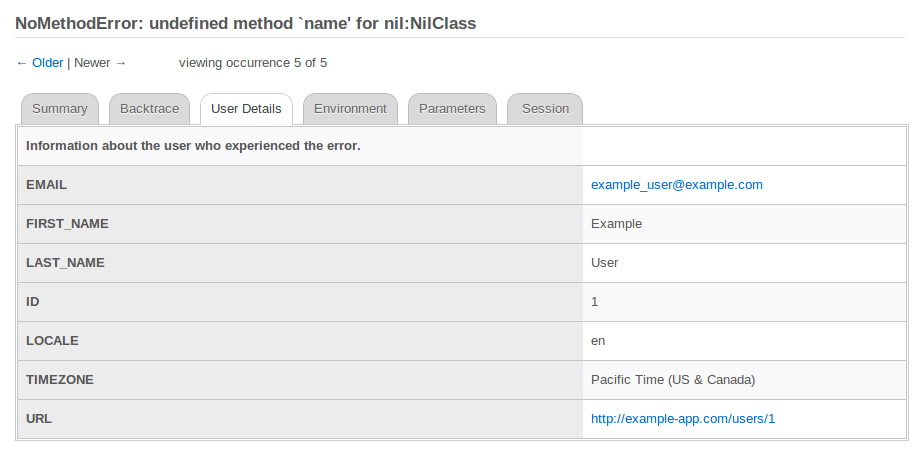Errbit is a tool for collecting and managing errors from other applications.
It is Airbrake API compliant, so if you are already using
Airbrake, you can just point the airbrake gem to your Errbit server.
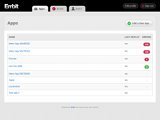
Apps |
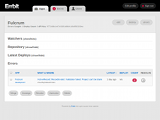
Errors |
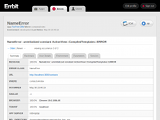
Error Summary |
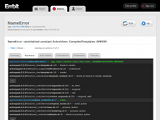
Error Backtraces |
Join the Google Group at https://groups.google.com/group/errbit to receive updates and notifications.
The list of requirements to install Errbit are:
- Ruby >= 2.3.x
- MongoDB 3.4.x-4.0.x
Note: This app is intended for people with experience deploying and maintaining Rails applications.
- Install MongoDB
git clone https://github.com/errbit/errbit.gitbundle installbundle exec rake errbit:bootstrapbundle exec rails server
Errbit configuration is done entirely through environment variables. See configuration
The way Errbit arranges notices into error groups is configurable. By default, Errbit uses the notice's error class, error message, complete backtrace, component (or controller), action and environment name to generate a unique fingerprint for every notice. Notices with identical fingerprints appear in the UI as different occurences of the same error and notices with differing fingerprints are displayed as separate errors.
Changing the fingerprinter (under the "Config" menu) applies to all apps and
the change affects only notices that arrive after the change. If you want to
refingerprint old notices, you can run rake errbit:notice_refingerprint.
Since version 0.7.0, the notice grouping can be separately configured for each app (under the "edit" menu).
An Errbit app is a place to collect error notifications from your external application deployments.
See apps
- Set
GITHUB_AUTHENTICATION=true - Register your instance of Errbit at https://github.com/settings/applications/new
If you host Errbit at errbit.example.com, you would fill in:
- After you have registered your app, set
GITHUB_CLIENT_IDandGITHUB_SECRETwith your app's Client ID and Secret key.
When you start your application, you should see the option to Sign in with GitHub on the Login page. You will also be able to link your GitHub profile to your user account on your Edit profile page.
If you have signed in with GitHub, or linked your GitHub profile, and you're working with an App that has a GitHub repo configured, then you will be able to create issues on GitHub. If you use another issue tracker, see Issue Trackers.
You can change the OAuth scope Errbit requests from GitHub by setting
GITHUB_ACCESS_SCOPE. The default ['repo'] is very permissive, but there are a
few others that could make sense for your needs:
- GITHUB_ACCESS_SCOPE="['repo']"
- Allow creating issues for public and private repos
- GITHUB_ACCESS_SCOPE="['public_repo']"
- Allow creating issues for public repos only
- GITHUB_ACCESS_SCOPE="[]"
- No permissions at all, but allows errbit login through github
GITHUB_ORG_IDis an optional environment variable you can set to your own github organization id. If set, only users of the specified GitHub organization can log in to Errbit through GitHub. Errbit will provision accounts for new users.
- Set GOOGLE_AUTHENTICATION=true
- Register your instance of Errbit at https://console.developers.google.com/apis/api/plus/overview
If you host Errbit at errbit.example.com, you would fill in:
- URL
- http://errbit.example.com
- Callback URL
- http://errbit.example.com/users/auth/google_oauth2/callback
- After you have registered your app, set
GOOGLE_CLIENT_IDandGOOGLE_SECRETwith your app's Client ID and Secret key.
When you start your application, you should see the option to Sign in with Google on the Login page. You will also be able to link your Google profile to your user account on your Edit profile page.
- Set
ERRBIT_USER_HAS_USERNAME=true - Follow the devise_ldap_authenticatable setup instructions.
- Set
config.ldap_create_user = trueinconfig/initializers/devise.rb, this enables creating the users from LDAP, otherwhise login will not work. - Create a new initializer (e.g.
config/initializers/devise_ldap.rb) and add the following code to enable ldap authentication in the User-model:
Errbit::Config.devise_modules << :ldap_authenticatable- If you are authenticating by
username, you will need to set the user's email manually before authentication. You must add the following lines toapp/models/user.rb:
def ldap_before_save
name = Devise::LDAP::Adapter.get_ldap_param(self.username, "givenName")
surname = Devise::LDAP::Adapter.get_ldap_param(self.username, "sn")
mail = Devise::LDAP::Adapter.get_ldap_param(self.username, "mail")
self.name = (name + surname).join ' '
self.email = mail.first
end- Now login with your user from LDAP, this will create a user in the database
- Open a rails console and set the admin flag for your user:
user = User.first
user.admin = true
user.save!When upgrading Errbit, please run:
git pull origin master # assuming origin is the github.com/errbit/errbit repo
bundle install
rake db:migrate
rake db:mongoid:remove_undefined_indexes
rake db:mongoid:create_indexes
rake assets:precompileThis will ensure that your application stays up to date with any schema changes.
There are additional steps if you are upgrading from a version prior to v0.4.0.
Errbit can now display information about the user who experienced an error. This gives you the ability to ask the user for more information, and let them know when you've fixed the bug.
The Airbrake gem will look for current_user or current_member. By default it will only send the id of the user, to specify other attributes you can set config.user_attributes. See the Airbrake wiki for more information.
If user information is received with an error report, it will be displayed under the User Details tab:
This tab will be hidden if no user information is available.
You can log javascript errors that occur in your application by including the airbrake-js javascript library.
Install airbrake-js according to the docs at and set your project and host as soon as you want to start reporting errors. Then follow along with the documentation at https://github.com/airbrake/airbrake-js/blob/master/README.md
var airbrake = new airbrakeJs.Client({
projectId: 'ERRBIT API KEY',
projectKey: 'ERRBIT API KEY (again)',
reporter: 'xhr',
host: 'https://myerrbit.com'
});You can extend Errbit by adding Ruby gems and plugins which are typically gems.
It's nice to keep track of which gems are core Errbit dependencies and which
gems are your own dependencies. If you want to add gems to your own Errbit,
place them in a new file called UserGemfile and Errbit will treat that file
as an additional Gemfile. If you want to use a file with a different name, you
can pass the name of that file in an environment variable named USER_GEMFILE.
If you want to use errbit_jira_plugin, just add it to UserGemfile:
echo "gem 'errbit_jira_plugin'" > UserGemfile
bundle installEach issue tracker integration is implemented as a gem that depends on errbit_plugin. The only officially supported issue tracker plugin is errbit_github_plugin.
If you want to implement your own issue tracker plugin, read the README.md file at errbit_plugin.
Errbit will log it's own errors to an internal app named Self.Errbit. The Self.Errbit app is automatically created when the first error happens.
If your Errbit instance has logged an error, we would appreciate a bug report on GitHub Issues. You can post this manually at https://github.com/errbit/errbit/issues, or you can set up the GitHub Issues tracker for your Self.Errbit app:
- Go to the Self.Errbit app's edit page. If that app does not exist yet,
go to the apps page and click Add a new App to create it. (You can also
create it by running
rake airbrake:test.) - In the Issue Tracker section, click GitHub Issues.
- Fill in the Account/Repository field with errbit/errbit.
- Fill in the Username field with your github username.
- If you are logged in on GitHub, you can find your API Token on this page: https://github.com/account/admin.
- Save the settings by clicking Update App (or Add App)
- You can now easily post bug reports to GitHub Issues by clicking the Create Issue button on a Self.Errbit error.
If you need help, try asking your question on StackOverflow using the tag errbit: https://stackoverflow.com/questions/tagged/errbit
In theory, any Airbrake-compatible error catcher for other languages should work with Errbit. Solutions known to work are listed below:
| Language | Project |
|---|---|
| PHP (>= 5.3) | flippa/errbit-php |
| OOP PHP (>= 5.3) | emgiezet/errbitPHP |
| Python | mkorenkov/errbit.py , pulseenergy/airbrakepy |
See our wiki page for a list of people and companies around the world who use Errbit. You may edit this page, and add your name and country to the list if you are using Errbit.
- Michael Parenteau - For rocking the Errbit design and providing a great user experience.
- Nick Recobra (@oruen) - Nick is Errbit's first core contributor. He's been working hard at making Errbit more awesome.
- Nathan Broadbent (@ndbroadbent) - Maintaining Errbit and contributing many features
- Vasiliy Ermolovich (@nashby) - Contributing and helping to resolve issues and pull requests
- Marcin Ciunelis (@martinciu) - Helping to improve Errbit's architecture
- Cyril Mougel (@shingara) - Maintaining Errbit and contributing many features
- Relevance - For giving me Open-source Fridays to work on Errbit and all my awesome co-workers for giving feedback and inspiration.
- Thoughtbot - For being great open-source advocates and setting the bar with Airbrake.
See the contributors graph for more details.
See the contribution guidelines
Check the .travis.yml file to see how tests are run
Copyright (c) 2010-2015 Errbit Team


